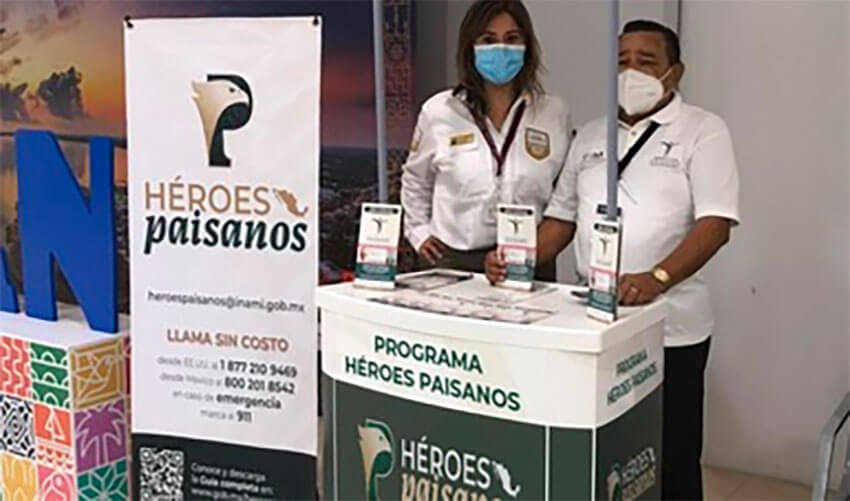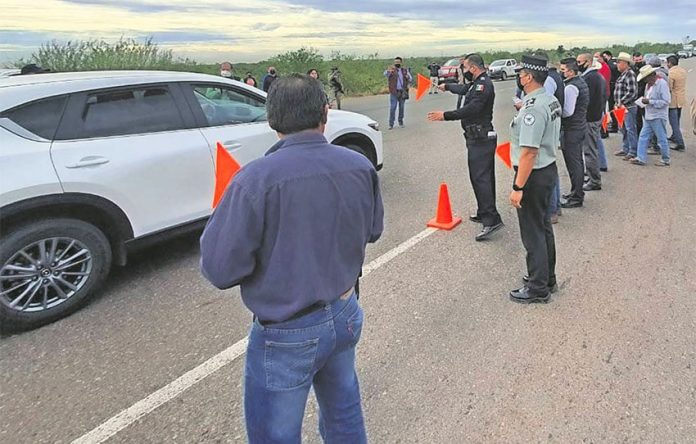Mexicans returning home for the end-of-year holiday season are being forced to pay bribes to customs officers, immigration agents, police, members of organized crime gangs and others.
United States-based migrants – frequently referred to as heroes by President López Obrador due to the large quantities of money they send to their families in Mexico – have reported having to hand over as much as US $2,000 in bribes during road trips to their home towns.
Mexicans flying home have also been victims of extortion, the newspaper El Universal reported.
Pedro Muñoz, a 25-year resident of Fresno, California who travels home to Pénjamo, Guanajuato, every year, said returning migrants have been forced to pay bribes to authorities for years, but the number of officials demanding them is higher than ever.
“With or without the Programa Paisano [Compatriot Program], they always extort us,” he said, referring to a government initiative which encourages Mexicans returning home for holidays to travel in convoys escorted by security forces.
“Before it was only customs officers, Federal Police and [state] police but now it’s the National Guard, immigration agents and [organized] crime as well,” Muñoz told El Universal.
“On my way home from Tijuana a week ago I spent more than US $1,000 in bribes. There are checkpoints where you don’t know if they’re police, customs officers or immigration agents,” he said.
Several other U.S.-based migrants recounted similar experiences in social media posts and in interviews with El Universal and Reforma.
“On our way to Torreón [Coahuila] at the start of December we crossed from Laredo, Texas, but when we were going through San Pedro [a municipality in Coahuila] people from [the federal tax agency] SAT stopped us. … The entire road is a shakedown for money; between bribes [handed over to authorities] and two roadblocks with hooded men [we paid] almost US $2,000,” said Leticia Uribe.
“When it’s not … [officials from SAT, which oversees customs], it’s immigration agents or police,” she said.
“They’re asking for a lot of documents in order to allow us to bring vehicles in. It’s a big show,” said Jaime, who was extorted when he entered Mexico at Nuevo Laredo, Tamaulipas, en route to Guerrero from Atlanta, Georgia.

“We crossed at the Tijuana port of entry. Everything was fine until we reached Ciudad Obregón, [Sonora]. From there on there were roadblocks or police [checkpoints] in every city … and [we had to pay] bribes of 400 to 600 pesos [about US $20 to $30],” said Leonardo Mendoza, a California resident who returned to his home town in Michoacán.
“On the way to Veracruz a transit police officer stopped me. I showed him all the permits and my license and documents. He only asked for a 200-peso bribe. I didn’t argue because the big thieves are in customs,” said Carmelo León.
Santos Ortiz, a California resident, said he returns to Mexico two or three times a year and always brings medical equipment and other items to donate to disabled people and the elderly.
“At the Nogales port of entry I tried to cross with a trailer [filled] with wheelchairs, walkers, diapers and clothes for the elderly. It’s to help fellow citizens in Michoacán and Colima but at customs, despite having everything in order, the police extorted me,” he said.
Ortiz also had to pay hundreds of dollars on two occasions to members of the National Guard, the quasi-militarized security force inaugurated by López Obrador in mid-2019.
Rogelio Ávila, president of a United States-based Mexican migrants association, said the name of the security initiative might have changed – it’s now called the Programa Héroes Paisanos – but the old practice of extorting migrants remains.
“There are still bad agents. They [returning migrants] are reporting to us that they’re being stopped at the 26-kilometer checkpoint [on the Nuevo Laredo-Monterrey highway] and having their [vehicle] permits checked. The National Immigration Institute agents are asking them for money,” he said.
“It’s ridiculous but it’s still necessary to protect fellow citizens from our own authorities,” Ávila said.
Buses transporting U.S.-based migrants to Mexico have also been stopped by customs officers who demand up to $900 from the drivers. Passengers routinely chip in US $20 or $30 each to raise the amount requested to allow the bus to pass without impediment.
Edmundo Ramírez, an immigration expert and former consul general in Seattle, said the commencement of the Programa Paisano invariably gives rise to extortion, the demanding of bribes and other abuses by immigration agents, customs officers, police and the National Guard.
Immigration and customs agents at airports are also demanding payments from returning migrants on the grounds their papers aren’t in order, he said.
El Universal sought comment from the National Immigration Institute and the General Customs Administration about the returning migrants’ reports but received no response from either.
With reports from El Universal and Reforma
